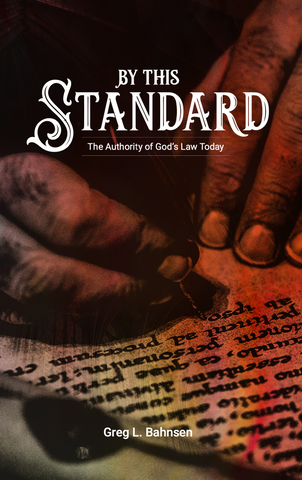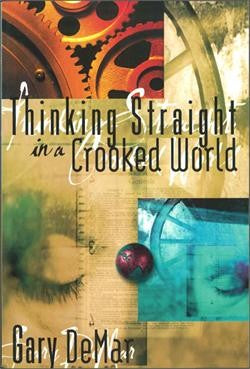A documentary film called 1946 claims that the 1946 Revised Standard Version translation imported the word “homosexuality” into the Bible when the New Testament does not use the word “homosexual.” Someone brought up this argument regarding Joanna and Chip Gaines and their defense of having a homosexual couple on their new show. “[A] translational error caused the word homosexual to be added to the Bible 80 years ago.” Let’s put this argument to the test.

The 1946 website opens with the following hook: “What if the word ‘homosexual’ was never meant to be in the Bible?”
Where should we begin? With Creation. God made them male and female. First, this creation description should end any debate over the legitimacy of homosexuality. Second, the command was to be “fruitful and multiply” (Gen. 1:28). Same-sex sexuality (homo + sex = homosexual) cannot fulfill this command. On the merits of creation alone, homosexuality is excluded. In making them male and female, God created their anatomy to accommodate the command to be fruitful and multiply. (Even atheistic evolution concedes that male-female sexual relationships are required for evolution to take place: No male and female, no reproduction, therefore no evolution.) Is it any wonder why the Apostle Paul describes the same-sex relationship as “unnatural” (Rom. 1:26-27)? In biblical terms, marriage is exclusively heterosexual (different + sex = heterosexual). Jesus said it was like this from “the beginning” that God ‘God made them male and female” (Matt. 19:5; Matt. 1:27; 5:2).
We find the following in Romans 1 that describes the anti-creation norm:
For this reason, God gave them over to degrading passions; for their women exchanged the natural function for that which is unnatural, and in the same way also the men abandoned the natural function of the woman and burned [ἐξεκαύθησαν] in their desire toward one another, men with men committing indecent acts and receiving in their own persons the due penalty of their error.
This is not a description of pedophilia (an adult or older adolescent who experiences a primary or exclusive sexual attraction to prepubescent children) or pederasty (a sexual relationship between an adult man and a pubescent or adolescent boy). Homosexuals try to argue that Paul is describing the upper classes in Rome using their political and economic stations to abuse boys sexually. First, this is an admission that Paul is describing same-sex sexuality: “men with men,” the definition of “homo” (same) “sex” sexuality. Second, the sexual relationship is mutual, “burned [ἐξεκαύθησαν] in their desire toward one another.” The desire is mutual. One person is not being forced to comply by being dominated by older males and females to procure young boys and girls for sex. The “desire” is mutual. This is not the case where force, compulsion, and status (e.g., slaver owners) are involved.

By This Standard
God's Law is Christianity's tool of dominion. This is where any discussion of God's law ultimately arrives: the issue of dominion. Ask yourself: Who is to rule on earth, Christ or Satan? Whose followers have the ethically acceptable tool of dominion, Christ's or Satan's? What is this tool of dominion, the Biblically revealed law of God, or the law of self-proclaimed autonomous man? Whose word is sovereign, God's or man's?
Buy NowHere we get a little technical. The argument comes down to how the 1946 Revised Standard Bible translated a particular Greek word in 1 Corinthians 6:9 (ἀρσενοκοῖται) and 1 Timothy 1:10 (ἀρσενοκοῖται) as “homosexual.” The 1611 KJV translates the Greek ἀρσενοκοίταις (arsenokoitais) in 1 Timothy 1:10 as “for them that defile themselves with mankind.” This is more like a euphemism than a definition. The 1560 Geneva Bible translates arsenokoitais as “buggerers,” a word that usually refers to anal intercourse. Why didn’t the translators use the word “homosexual”? Because the word didn’t exist, but the behavior did. It didn’t need to exist because the description of the sex act is specific in the Bible. Would it be accurate to translate “the husband of one wife” in 1 Timothy 3:2 as “not a bigamist or a polygamist”? Yes, it would. But we know what Paul meant.
Many words we use today didn’t exist centuries or even a decade ago. Consider the “Glossary of LGBTQ+ and Gender Terms” used to describe a multitude of contrived sexual identities, from “Abrosexual: An individual that has a fluid and/or rapidly changing sexuality that fluctuates between different sexualities” to “Two-Spirit (also two spirit or, occasionally, twospirited): A modern, pan-Indian, umbrella term used by some indigenous North Americans to describe certain people in their communities who fulfill a traditional third-gender (or other gender-variant) ceremonial role in their cultures.” At last count, there are 169 gender neologisms.
Then there is the panoply of gender affirming pronouns. None of these existed before 1946, but somehow, they are legitimate terms and identifiers among today’s LGBTQ+ crowd, but the word “homosexual” cannot be the proper word to translate certain Greek words found in the Bible.
Consider 1 Timothy 1:10 again: “To whoremongers, to buggerers, to menstealers, to liars, to the perjured….” The KJV translates the Greek word ἀνδραποδισταῖς as “menstealers.” Some translations translate it as “enslavers” (ESV)[1] or “slave traders” (e.g., NIV, NLT). The New King James translation translates it as “kidnappers.” Each of these translations is descriptive of what the word means even though those words did not exist at the time these translations were published (1560: Geneva Bible/1611: KJV).
When you go to the Greek translation of the Old Testament (Septuagint/LXX) the same Greek word in Leviticus 18:22 and 20:13 is found in 1 Cor. 6:9 and 1 Tomothy 1:10. It’s from these two verses that we get the definition of homo (same) sex-sexuality because these OT verses describe same-sex sexuality. You can see the word “coitis” (κοίτην/koiten), sexual intercourse, in the description. So whatever is described in Leviticus 18:22 (below) and 20:13, is described by Paul in 1 Corinthians 6:9 and 1 Tmothy 1:10: “a male who has sexual intercourse with males, especially in a penetrative role.”
Arsenos means male and koiten means “to lie down”: “arsenokoítēs …, ‘a male’ and koítē, ‘a mat, bed’) — properly, a man in bed with another man; a homosexual.” For example, “You shall not lie in bed with a male as those who lie with a female; it is an abomination” (Lev. 18:22). To a male to engage in sexual relations with another male is the definition of homosexuality.
Will any of this convince homosexuals and those who defend their behavior? It might, but don’t count on it. It’s not about facts. The Apostle Paul describes how people “suppress the truth in unrighteousness” (Rom. 1:18). Sin blinds the eyes and makes the ears deaf to the truth.

Thinking Straight in a Crooked World
The nursery rhyme "There Was a Crooked Man" is an appropriate description of how sin affects us and our world. We live in a crooked world of ideas evaluated by crooked people. Left to our crooked nature, we can never fully understand what God has planned for us and His world. God has not left us without a corrective solution. He has given us a reliable reference point in the Bible so we can identify the crookedness and straighten it.
Buy NowThe homosexual movement will do anything to appeal to the ill-informed, and it often works. For example, one argument used is an appeal to Martin Luther’s translation of the Bible into German and the use of the word knabenschender that pro-homosexuals claim meant “boy molester.” If Luther only meant to condemn pederasty, a sexual relationship between an adult man and a pubescent or adolescent boy, then why did he write the following?
Martin Luther correctly identifies homosexuality with the sin of Sodom. Commenting on Genesis 19:4-5 he writes: “I for my part do not enjoy dealing with this passage, because so far the ears of the Germans are innocent of and uncontaminated by this monstrous depravity; for even though disgrace, like other sins, has crept in through an ungodly soldier and a lewd merchant, still the rest of the people are unaware of what is being done in secret. The Carthusian monks deserve to be hated because they were the first to bring this terrible pollution into Germany from the monasteries of Italy.” (Luther’s Works, 3:251-252).
In the same section of Luther’s Genesis lecturers, he refers to “the heinous conduct of the people of Sodom” as “extraordinary, inasmuch as they departed from the natural passion and longing of the male for the female [see Rom. 1:26-27], which is implanted into nature by God, and desired what is altogether contrary to nature. Whence comes this perversity? Undoubtedly from Satan, who after people have once turned away from the fear of God, so powerfully suppresses nature that he blots out the natural desire and stirs up a desire that is contrary to nature.” (Luther’s Works, 3:255)
A standard argument used against the Bible’s prohibition of homosexuality is the claim that Jesus or His disciples never mentioned it. They didn’t have to since any Jew familiar with the Torah knew same-sex sexuality was an abomination. That’s why Jesus didn’t have to condemn rape (Deut. 22:25-26), sex with animals (Ex. 22:29), incest (Lev. 18:6-18), abortion (Ex. 21:22-25), kidnapping (Ex. 21:16; Deut. 24:7), arson (Ex. 22:6), or tripping blind people (Lev. 19:14). Following the Jesus-didn’t-mention-it argument, Jesus must not have been opposed to rape, incest, kidnapping, bestiality, sex with minors, abortion, or tripping blind people.
[1] “That is, those who take someone captive in order to sell him into slavery.”

